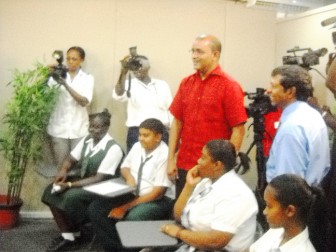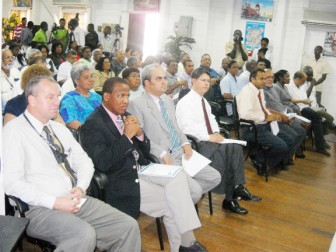President Bharrat Jagdeo launched the Educational Television Broadcasting Service (ETBS) yesterday, saying that it will serve to narrow the gaps in providing quality education across the country.
“Just imagine an Amerindian village being able, with one television set in the school…, to see the best Maths or Science teacher in our country taking them through equations in that village,” Jagdeo said in the feature address yesterday at the National Centre for Educa-tional Re-source Develop-ment (NCERD), where the ETBS will be based.

“We are spending just under a million US dollars for this channel. It is not that expensive compared to the sums of money that is for the infrastructure, nor the content, compared to the money that we spend in the education sector,” Jagdeo stated.
ETBS is a satellite broadcast system which “is different in funding and technology.” According to Dr Seeta Shah Roath, the head of the multimedia unit, ETBS is established along the PBS model that India, Mexico, the UK and the United States are using.
“Content is targeted to…preschoolers, kindergarteners, primary, secondary school students, tertiary educations students, technical and vocational students, teachers, early school leavers,” she said.
“We are creating and acquiring programmes that are entertaining yet educational. We are attempting to capture our viewers’ interest, maintain that interest, achieve the different learning outcomes and inspire our viewers to be creative, to aspire to really achieve their learning goals whatever those may be,” she added.
ETBS will be broadcast on Channel 29/Cable 80. Initially, the channel will be accessible in Georgetown, Essequibo and on the coast before it moves across the country. In between shows there will be public service announcements. There will be no advertisements.
“By the end of July all three phases will be rolled out so that kids in the deep south in the Rupununi will have this access to information that kids or people along the coast will have too,” the President said. He added that he was very pleased with the launch of the education channel.
However the President expressed concern over the content. “One big worry I have is our ability to generate content.

Now we can borrow content a lot but the content has to be country specific in some circumstances. We need to have good quality content. We need to get the best teachers and not just teachers. How do we get our culture workers to start putting their content online too?” Jagdeo stated.
According to Jagdeo, the creation of content that is distinct to Guyana and to the Caribbean could “spawn an industry” and the government could pay for that content “if it has educational value” but “the education ministry will have to decide.”
‘A break from
politics’
The new education channel has endless possibilities and potential, the President noted. He also emphasised that it will be free of politics. The President declared: “One thing I made clear, we need one channel with a break from politics in this country and this one will be it. There will be absolutely no politics on this channel, none whatsoever.
“We need a break; Guyanese need that from all of this stuff that is going on. This will be that channel where you can go there and you are not going to hear anything about PPP or PNC or any other group. This is all about educating our people right across the country.”
Meanwhile, Jagdeo also stated that the ETBS will “have a major supporting role to play for the One Laptop Per Family (OLPF)” project.
Jagdeo said that bids to procure the computers are out and he projects that over the next four months some 50,000 computers will be available for distribution to families to meet the targeted 90,000 families. “We were thinking how do we ensure that people are appropriately trained so that they can use the computers? But just imagine the possibility of this; everyone who receives a laptop from the government tuning in at 10 am… to take them through the fundamentals of computers,” he said.
Jagdeo said that the ETBS will have a major supporting role to play for the OLPF since “it makes our job easier. We can train people en masse on the use of the computer.”
In the meantime, while the ETBS is expected to complement the OLPF, it is hoped that the OLPF will complement the University of Guyana in providing online courses. “Clearly we won’t be able to do online education through this [ETBS] because you need some interaction between the students and the lecturers.
“But OLPF will hopefully assist this project tremendously to have an aggressive online programme for women and men and everyone who can’t come physically to the university in the future so that they too can have access to university education.”
As relates to quality university education, the President announced that some US$11 million will be “pumped” into the creation of a “world class school of biodiversity.”
While the President acknowledged the strides made in the education system he stated that there needs to be focus on quality. “If we have a shortage of good teachers and we have been training a larger number of teachers now more than ever before.
But we have migration – then how do we solve this problem where kids across the country will have at least some uniformity in access to quality teaching and that not all the best teachers are taken from rural schools and from south Georgetown and brought to the elite schools in north Georgetown when they have shortages there?”
He stated there needs to be a difference in thought. “And therefore this [the ETBS] is one of those initiatives to start doing things differently to get more value for our money that we spend, to get more of our people accessing information and being able to access quality information,” Jagdeo explained.
Meanwhile, Education Minister Shaik Baksh said yesterday’s launch “heralds a new era.” ETBS, Baksh said, allows for the expansion of access to education programmes to all segments of the population.
The minister acknowledged the challenge of quality education but believes that through the use of technology “we can move from accessing learning to success in learning.”









